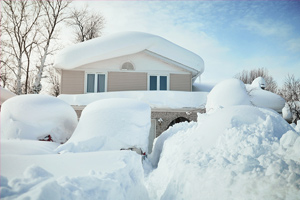Our companies are backed by the Best Pick Guarantee. Call one today!
Prevent These Common Winter Disasters from Spoiling Your Holiday
December 18th, 2015 byEveryone hopes for a smooth holiday season—especially if you’re the host of this year’s festivities. But too often, it seems that Murphy’s Law comes into play when the house is full of guests, and the water heater gives up the ghost just as your in-laws arrive, or the furnace goes out on the night your area experiences record low temperatures. Sometimes, these winter disasters are simply inevitable, but adequate preparation for the winter months can lessen the likelihood of them happening.
Frozen Pipes

Severe winter weather can send temperatures plummeting below the freezing mark. When this happens, outdoor pipes, spigots, and faucets run a high risk of freezing. Indoor pipes that are uninsulated and close to an exterior wall also have a higher chance of succumbing to the low temperatures. Pipes can be insulated against the cold with a variety of materials, but it’s a good idea to leave faucets dripping just slightly if freezing temperatures are predicted. If a pipe does freeze, use low, gradual heat—heating pads and hair dryers work well—to melt the ice. Learn how to handle frozen pipes.
Water Heater Failure
Water heaters don’t last forever—they typically have a lifespan of 10 to 15 years unless otherwise noted by the manufacturer. If you’re concerned that your water heater may be on its last legs, there are some telltale signs to be aware of. Don’t ignore strange sounds or water leaking from the tank. These are both clues that something isn’t right. Take a look at the hot water coming out of the faucet. If it’s rusty or muddy, there is a strong possibility that your water heater is close to failure. Another sign of impending water heater death is tap water that smells or tastes metallic; this is an indication that components inside the tank are breaking down. If you can replace an aging water heater before it fails completely, you’ll save yourself the hassle and expense of an emergency visit from the plumber—and you won’t have to take any cold showers.
HVAC Unit Failure
Similar to other major household appliances, HVAC units seem to fail most frequently when temperatures reach winter or summer extremes. Regular maintenance—most sources recommend checks in the spring and fall—by qualified HVAC professionals will help the unit function efficiently and can alert you to potential problems before they cause catastrophic damage. Dirty air conditioning and heating units have to work harder than necessary to cool or heat a home, so be sure to have the air conditioning coils cleaned regularly, and change the unit’s filters as recommended by the manufacturer. Be mindful of other issues that might indicate larger, more complicated problems. If the system is constantly running or having a hard time maintaining a set temperature, for example, there may be a sensor problem or an issue with the electronics inside the unit. In these cases, your best bet is to call an HVAC service provider.
Roof Damage

Snow might look light and fluffy when it falls from the sky, but it can add a significant amount of weight to your home’s roof as it accumulates. If ice comes into the picture, that weight can quickly increase. If your roof is steeply sloped, you may not have as many problems with accumulating winter precipitation, but if your roof is flat or has a low slope, you’ll need to be vigilant about removing excess snow and ice. Generally speaking, most roofs on residential structures—provided they aren’t already damaged or otherwise compromised—are designed to support 20 pounds of snow per square foot. Any additional weight could cause the roof to fail. Before winter hits with full force, look for a snow rake with an extension handle to remove snow from the roof.
Some winter household disasters simply can’t be predicted or prevented, but ensuring that your home’s appliances and major systems are properly maintained as well as following some basic winter safety tips can help the holiday season run as smoothly as possible.

























